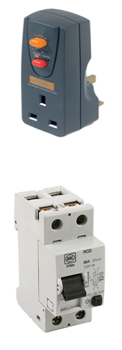What is an RCD?An RCD, or Residual Current Device, is an electrical device designed to shut off current quickly when it detects current leakage (potentially through a human body). Operating properly, it could prevent you or one of your family members from being electrocuted (killed by electricity) should you come into contact with a live appliance or bare wire. It can also provide some protection against fire. RCDs offer a level of protection above and beyond that of ordinary fuses or circuit-breakers.
It works by measuring the difference between the current of the live conductor and the neutral conductor in the electrical circuit. When it detects a pre-set difference (typically in the range of 5-25 mA), it will shut off the electricity very quickly (in less than 300 ms which is fast, but not that fast - Usain Bolt reacts to the starter's gun in about half that time). These levels and times are specifically designed to stop enough electricity reaching the heart and causing fibrillation, which is the most common cause of electrical death. Electrical Safety First reports that RCDs are about 97% reliable, which can improve with regular inspections. They can either be a separate plug in device or one that is integrated into a modern day fuse board. There are also special socket-outlets with an RCD built into them. Although RCD protection reduces the risk of electric shock, it does not reduce the need to be careful. Have your wiring checked at least once every 10 years to ensure your safety. To check if you already have an RCD protecting your home, go to your fuse board and see if you have a device with a push button marked ‘T‘ or ‘test‘. This button is part of an RCD. |

|
|

